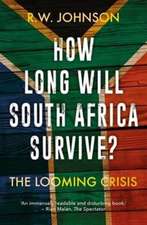Libya in Western Foreign Policies, 1911–2011: Security, Conflict and Cooperation in the Contemporary World
Autor Saskia Van Genugtenen Limba Engleză Paperback – 19 dec 2018
| Toate formatele și edițiile | Preț | Express |
|---|---|---|
| Paperback (1) | 380.63 lei 6-8 săpt. | |
| Palgrave Macmillan UK – 19 dec 2018 | 380.63 lei 6-8 săpt. | |
| Hardback (1) | 384.86 lei 6-8 săpt. | |
| Palgrave Macmillan UK – 7 iun 2016 | 384.86 lei 6-8 săpt. |
Din seria Security, Conflict and Cooperation in the Contemporary World
- 9%
 Preț: 765.10 lei
Preț: 765.10 lei - 20%
 Preț: 689.80 lei
Preț: 689.80 lei - 20%
 Preț: 565.89 lei
Preț: 565.89 lei - 20%
 Preț: 629.10 lei
Preț: 629.10 lei - 18%
 Preț: 785.42 lei
Preț: 785.42 lei - 18%
 Preț: 775.15 lei
Preț: 775.15 lei -
 Preț: 386.61 lei
Preț: 386.61 lei - 15%
 Preț: 584.43 lei
Preț: 584.43 lei - 15%
 Preț: 693.25 lei
Preț: 693.25 lei - 15%
 Preț: 527.97 lei
Preț: 527.97 lei - 15%
 Preț: 638.25 lei
Preț: 638.25 lei -
 Preț: 384.86 lei
Preț: 384.86 lei -
 Preț: 481.43 lei
Preț: 481.43 lei -
 Preț: 384.09 lei
Preț: 384.09 lei -
 Preț: 383.12 lei
Preț: 383.12 lei -
 Preț: 391.61 lei
Preț: 391.61 lei - 15%
 Preț: 638.76 lei
Preț: 638.76 lei - 18%
 Preț: 778.45 lei
Preț: 778.45 lei - 15%
 Preț: 639.37 lei
Preț: 639.37 lei -
 Preț: 390.63 lei
Preț: 390.63 lei -
 Preț: 385.84 lei
Preț: 385.84 lei - 15%
 Preț: 471.69 lei
Preț: 471.69 lei - 15%
 Preț: 586.55 lei
Preț: 586.55 lei -
 Preț: 385.25 lei
Preț: 385.25 lei -
 Preț: 383.33 lei
Preț: 383.33 lei - 18%
 Preț: 731.10 lei
Preț: 731.10 lei - 18%
 Preț: 891.80 lei
Preț: 891.80 lei - 15%
 Preț: 699.77 lei
Preț: 699.77 lei - 15%
 Preț: 703.20 lei
Preț: 703.20 lei - 15%
 Preț: 588.18 lei
Preț: 588.18 lei -
 Preț: 386.81 lei
Preț: 386.81 lei - 18%
 Preț: 786.36 lei
Preț: 786.36 lei - 15%
 Preț: 638.57 lei
Preț: 638.57 lei -
 Preț: 390.63 lei
Preț: 390.63 lei
Preț: 380.63 lei
Nou
Puncte Express: 571
Preț estimativ în valută:
72.84€ • 79.10$ • 61.19£
72.84€ • 79.10$ • 61.19£
Carte tipărită la comandă
Livrare economică 22 aprilie-06 mai
Preluare comenzi: 021 569.72.76
Specificații
ISBN-13: 9781349696215
ISBN-10: 1349696218
Pagini: 187
Ilustrații: VII, 187 p.
Dimensiuni: 148 x 210 mm
Greutate: 0.24 kg
Ediția:1st ed. 2016
Editura: Palgrave Macmillan UK
Colecția Palgrave Macmillan
Seria Security, Conflict and Cooperation in the Contemporary World
Locul publicării:London, United Kingdom
ISBN-10: 1349696218
Pagini: 187
Ilustrații: VII, 187 p.
Dimensiuni: 148 x 210 mm
Greutate: 0.24 kg
Ediția:1st ed. 2016
Editura: Palgrave Macmillan UK
Colecția Palgrave Macmillan
Seria Security, Conflict and Cooperation in the Contemporary World
Locul publicării:London, United Kingdom
Cuprins
Introduction. - 1. Libya’s Origins: The Colonial Scraps of North Africa. - 2. Libya during the World Wars: Other people’s battlefield. - 3. Libya: A By-Product of Great Power Politics. - 4. The “Cyrenaican” King and the Anglo-American Alliance. - 5. Qaddafi’s Coup: Erasing Historical Deviations. - 6. Reagan and Libya: Bullying The Rogue. - 7. Reconciliation and Fighting Islamic Extremism Together. - 8. Post-Qaddafi Libya: Wishful Transitional Thinking,
Recenzii
“Saskia Van Genuggten’s book should be highly recommended to anyone wanting to gain a deeper understanding of the role of western countries in shaping Libya’s history.” (Krisztina, International Affairs Blog, medium.com, December, 2017)
“Libya in western foreign policies displays a solid grounding in contemporary Libyan history and deserves a wide audience. It provides a concise, readable summary of the central elements of Libyan foreign policy over the last century, making the book suitable for scholars and the general public alike. For those readers drawn to further study the topic, Van Genugten has provided an impressive bibliography of the most important works on the subject.” (Ronald Bruce, International Affairs, Vol. 93 (6), 2017)Notă biografică
Saskia van Genugten is Senior Researcher Fellow based in the United Arab Emirates. She has published extensively on developments in the MENA region and previously worked as Foreign Affairs Analyst at the Senate of the Netherlands.
Textul de pe ultima copertă
Libya has a short, volatile history. Foreigners played a significant role in shaping Libya’s institutions and policies, and this book explores longer term trends in the relations between Libya and the West, placing current developments in their historical context. Throughout history, the globe’s most powerful actors have regarded Libya as an outlier state of little significance. Libya belonged neither here nor there and never fell under the full protection of any significant global or regional powerhouse. Libya’s weak national identity, its weak institutions and its peripheral position have made it vulnerable to external influences and interventions. As a result, Libya repeatedly falls prey to foreign powers wanting to flex their muscles. As this book narrates, this was the case in 1911, in 2011 and several times in between.
Caracteristici
Traces the interests and ties of external powers with Libya from the moment Italy decided to colonize the provinces of Tripolitania and Cyrenaica in 1911 until 2011 Places current developments in Libya – and the role of external actors in particular – in their historical context Aims to overcome the compartmental and event-based nature of the mainstream narrative of Libya’s external relations







